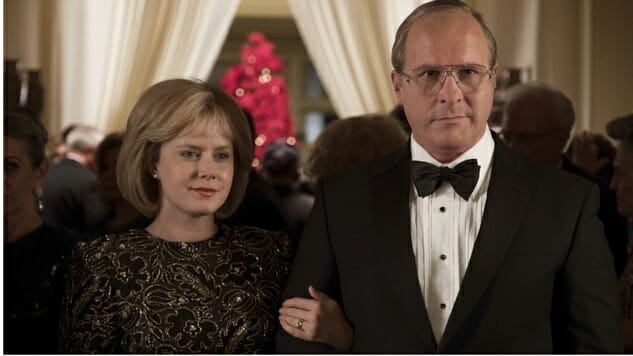In Defense of Vice

Strange as it sounds, the most transporting moment in Vice, writer/director Adam McKay’s deconstructionist biopic of former vice president Richard B. Cheney (Christian Bale), may be a straightforward scene focused on Cheney’s wife, Lynne (Amy Adams). Back in Casper, Wyoming, after an abortive stint at Yale, Dick has filled his time off from hanging telephone wires with drinking and fighting, provoking a couple of run-ins with the law. Lynne decides to put her foot down. “We’re going to discuss this right now,” she hisses, “while you smell like vomit and cheap booze.” The chewing-out that follows, in which Lynne paces, rages and rather hilariously cuts down her own mother (”’Does Dick want some coffee?’ Jesus Christ!”) before lamenting that she can’t enroll at Yale, helm a company or run for mayor as a man might, is so familiar it amounts to a genre convention: It forces our hero to put away childish things and set off on the road to greatness.
Punch-drunk on its own moonshine, Vice is closer in affect to Cheney’s boss/puppet, George W. Bush, than it is to Dick himself, and as such it paints its opposition to the traditional biopic in neon hues. It opens, for instance, with a new twist on that old canard, “Based on a true story”; swiftly introduces a fourth wall-breaking narrator (Jesse Plemons) with no apparent connection to the film’s subject; and “ends,” before its own midway point, on a note of ersatz valediction, replete with explanatory cards and rolling credits over images of a Cheney family idyll. The key to Vice, though—the reason, despite its flaws, that it doesn’t deserve to be lumped in with the lower tier of Best Picture nominees that includes Bohemian Rhapsody and Green Book—is its placement of McKay’s brasher, clumsier choices alongside his more conventional ones. After all, it’s Lynne’s argument with Dick that leads into the title sequence, with its warning to “Beware the quiet man”—when it comes to the biopic, Vice suggests, it’s the work you can’t see that poses the danger.
It’s no surprise, really, that reactions to the film have been decidedly mixed: Vice is both a genre provocation and a Big Short-style digest of the Bush administration’s misrule, and only the former challenges our prevailing understanding of its subject. But it’s the latter that’s featured most prominently in the film’s reception, to the point that a number of critics at Sundance, most prominently Vulture’s Nate Jones, described the CIA torture memos drama The Report as “the anti-Vice”—which seems at best a half-reading of McKay’s prickly creation. If Vice is a failed indictment of Cheney, handmaiden to war criminals for the better part of four decades, it is nonetheless a successful indictment of the narrative shorthand by which men of his ilk rise to power and exploit it unchecked, by which we’ve come to confuse “privilege” for “greatness,” “corruption” for “efficacy,” “evildoer” for “principled man.” By applying the genre’s heroic template to the cruel, cowardly, profoundly uninteresting Cheney, Vice grabs hold of its diseased heart: The biopic in its classical form, full of elisions and exaggerations, isn’t an answer to the narrator’s central question, “How does a man go on to become who he is?” It’s an attempt to dodge it.
They’re gawky, to be sure, but at least the film’s fantastical excesses—detours into an imagined circle jerk on the White House lawn, an opulent dinner at which “enhanced interrogation” is one of the night’s specials, an inside-the-Beltway board game in which Dick stacks the deck—cop to the biopic’s liberties, as opposed to, say, the film about racial reconciliation that never addresses its blinkered point of view, or the film about a queer, HIV-positive musical icon that manipulates the facts in order to demonize those aspects of his identity. Not long after its faux ending resolves into a ringing phone, for example, Vice finds Lynne looking askance at her husband for even considering the role of Vice President, over which Plemons intones, “We can’t just snap into a Shakespearean soliloquy that dramatizes every feeling and motivation. That’s just not the way the world works.” But it is the way the biopic works, upon which Vice comments with its usual bombast: McKay cuts to the couple climbing into bed, reciting verse to each other from his knockoff Bard. By the end of the sequence, the Cheneys have made their decision, which the film punctuates with a foreboding thunderclap. In other words, Vice may not be true, but it is honest.
-

-

-

-

-

-

-

-

-

-

-

-

-

-

-

-

-

-

-

-

-

-

-

-

-

-

-

-

-

-

-

-

-

-

-

-

-

-

-

-








































